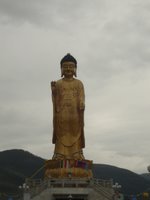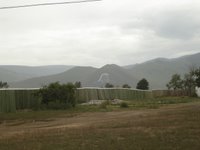Monday, August 07, 2006
UB
Most people don't say Ulan Bator (or Ulaanbaatar, the preferred transliteration). They just refer to it as UB. It's not an ancient city -- it was built in its current spot in 1778 -- and the name means 'red hero' and dates to the 1920s. (The red heroes referred to the alignmnet of Outer Mongolia to Russia and away from China.)
You see many names ending in baatar, so there are many heroes of Mongolia. Most names have that grandiose feel. The name of our IT guru translated to "golden ax" for example. I would imagine that name is helpful at the local nightclub, though it might lead to unrealistic expectations. We referred to him simply as Sukh; there is a famous leader known as Sukhbaatar, or "ax hero". I wonder what Hollywood would change that name to? Maybe Axel Foley.
 But back to UB: it still has many temples and other beautiful buildings. The picture I posted from there was of the Monastery of the Choijin Lama that sits among many modern grocery stores and several of the better restaurants there. And here is a statue that sits outside of the city, near the Zaisan Memorial but I cannot figure out for sure what this particular statue was called. It looks far too new to be unrefinished. (That will teach us to tour without a guide.)
But back to UB: it still has many temples and other beautiful buildings. The picture I posted from there was of the Monastery of the Choijin Lama that sits among many modern grocery stores and several of the better restaurants there. And here is a statue that sits outside of the city, near the Zaisan Memorial but I cannot figure out for sure what this particular statue was called. It looks far too new to be unrefinished. (That will teach us to tour without a guide.)One night I had dinner alone -- all my companions had friends in UB and were visiting them -- and sat outside at corner Italian restaurant (Bella -- the food was quite good, btw.) The architecture was mostly imported from the Soviets -- it looked eerily like any number of streets I had sat along in Yerevan or Kyiv (though a heck of a lot better than Skopje) -- but there were many small shops along it. The Mongolians have taken hold of the small retail shops that have been popular in most transition economies and built on them.
The people have very nice faces, different than Chinese with rather longer skulls. All the cars are Asian and have a mixture of right- and left-side steering wheels. There were many young western tourists around -- on a Thursday night at about 8pm, the place reminded me of 1993 Prague summertime. There are loads of Japanese visitors, and the Korean influence here is quite heavy, down to a boulevard named "Seoul Street". (There is even a Menards-like store called Seoul.) At the end of the evening I ask the waiter to call for a taxi to take me back to the hotel. His sister came out -- the waiter is the owner's son. She spoke excellent English and got me a cab and chatted while we waited. I asked how she learned English and she replies she went to high school in Vancouver. She wants to return to the US or Canada for a masters degree. (Luckily, I had business cards and directed her to SCSU.) There were a large number of young people who were studying or had studied in the States, in fact. The younger one was, the more likely the second language was English, not Russian.
One major problem one has is getting taxidrivers to understand anything other than Mongolian (an almost impossible language -- at least three distinct gutteral consonants and almost all vowels can be doubled to create some very strange sounds). Younger drivers do not get Russian at all. The hotel we stayed at -- I have nothing good to say about it, so I'll skip the name -- gave us cards to help taxis find the place because it was off the beaten path. Great, except the cards are printed in English. If they could read that, they'd probably understand me saying "turn left NOW."
Taxis aside, though, the most remarkable thing about the place is that it's a little like St. Cloud, insofar as it's a very large small town. I had an unfortunate incident in which I used my Visa cash card at an ATM. Now, I usually take the cash, then the card. Not a problem. This time, taking the cash first meant the machine thought I had forgotten my card and it re-entered the machine. It was a Saturday, and that afternoon I was supposed to leave for the tourist camp. It's one of those gaffes that seem so magnified because you are in a strange land. The driver of the van we were using that day, whom we had hired for $40, starts making calls, as do the people in charge of this project. The Americans get nowhere. The driver, though -- a young person just back from his first year of university in India -- uses his network to try to call friends of friends. Eventually he gets someone to call the card center for Visa for all of Mongolia. We arrive, and this driver knows the manager.
 They were classmates. "Does this happen often, that you know all these people?" "It depends, but there are only two good high schools in the city, and I went to one of them." Through his network, I received the card about two hours later, and damned if the thing didn't work the next day as promised.
They were classmates. "Does this happen often, that you know all these people?" "It depends, but there are only two good high schools in the city, and I went to one of them." Through his network, I received the card about two hours later, and damned if the thing didn't work the next day as promised.Chinggis Khaan smiled.









